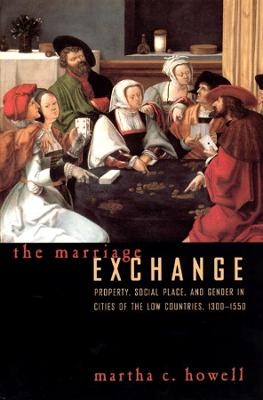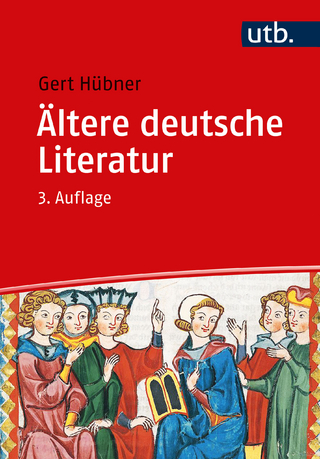
The Marriage Exchange
Property, Social Place, and Gender in Cities of the Low Countries, 1300-1550
Seiten
1998
University of Chicago Press (Verlag)
978-0-226-35515-3 (ISBN)
University of Chicago Press (Verlag)
978-0-226-35515-3 (ISBN)
- Titel z.Zt. nicht lieferbar
- Versandkostenfrei innerhalb Deutschlands
- Auch auf Rechnung
- Verfügbarkeit in der Filiale vor Ort prüfen
- Artikel merken
Medieval Douai left an enormous archive of documents. This text reveals how these documents were produced in an effort to regulate property and gender relations. At the centre was a shift to a property regime based on contract. The book explores why the law changed and assesses its effects.
Medieval Douai was one of the wealthiest cloth towns of Flanders, and it left an enormous archive documenting the personal financial affairs of its citizens--wills, marriage agreements, business contracts, and records of court disputes over property rights of all kinds. Based on extensive research in this archive, this book reveals how these documents were produced in a centuries-long effort to regulate--and ultimately to redefine--property and gender relations. At the center of the transformation was a shift from a marital property regime based on custom to one based on contract. In the former, a widow typically inherited her husband's property; in the latter, she shared it with or simply held it for his family or offspring. Howell asks why the law changed as it did and assesses the law's effects on both social and gender meanings but she insists that the reform did not originate in general dissatisfaction with custom or a desire to disempower widows. Instead, it was born in a complex economic, social and cultural history during which Douaisiens gradually came to think about both property and gender in new ways.
Medieval Douai was one of the wealthiest cloth towns of Flanders, and it left an enormous archive documenting the personal financial affairs of its citizens--wills, marriage agreements, business contracts, and records of court disputes over property rights of all kinds. Based on extensive research in this archive, this book reveals how these documents were produced in a centuries-long effort to regulate--and ultimately to redefine--property and gender relations. At the center of the transformation was a shift from a marital property regime based on custom to one based on contract. In the former, a widow typically inherited her husband's property; in the latter, she shared it with or simply held it for his family or offspring. Howell asks why the law changed as it did and assesses the law's effects on both social and gender meanings but she insists that the reform did not originate in general dissatisfaction with custom or a desire to disempower widows. Instead, it was born in a complex economic, social and cultural history during which Douaisiens gradually came to think about both property and gender in new ways.
Martha C. Howell is professor of history and director of the Institute for Research on Women and Gender at Columbia University.
Foreword Acknowledgments Note on Money, Dates, and Names Introduction Le Libert v. Rohard Ch. 1: From Custom to Contract Ch. 2: The Social Context of Custom Ch. 3: Legal Reform as Social Engineering Ch. 4: The Social Logic--and Illogic--of Custom Ch. 5: An Alternative Logic Ch. 6: Living with the New Ch. 7: The Weight of Experience Ch. 8: The Douaisien Reform in Historical Context Conclusion: Marie, Franchoise, and Their Sisters App. A: The Evolution of Douai's Douaire Coutumier App. B: Written Custom and Old Custom in Douai Glossary of Legal Terminology Glossary of Measures Bibliography Index
| Erscheint lt. Verlag | 22.6.1998 |
|---|---|
| Reihe/Serie | Women in Culture & Society Series WCS |
| Sprache | englisch |
| Maße | 16 x 23 mm |
| Gewicht | 595 g |
| Themenwelt | Geschichte ► Allgemeine Geschichte ► Mittelalter |
| Geisteswissenschaften ► Geschichte ► Regional- / Ländergeschichte | |
| Recht / Steuern ► EU / Internationales Recht | |
| Recht / Steuern ► Privatrecht / Bürgerliches Recht ► Sachenrecht | |
| Sozialwissenschaften ► Politik / Verwaltung ► Politische Theorie | |
| Sozialwissenschaften ► Soziologie | |
| ISBN-10 | 0-226-35515-2 / 0226355152 |
| ISBN-13 | 978-0-226-35515-3 / 9780226355153 |
| Zustand | Neuware |
| Haben Sie eine Frage zum Produkt? |
Mehr entdecken
aus dem Bereich
aus dem Bereich
eine neue Geschichte des Mittelalters
Buch | Hardcover (2023)
C.H.Beck (Verlag)
38,00 €


